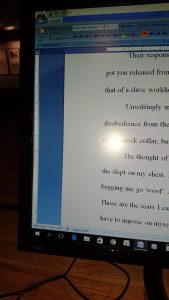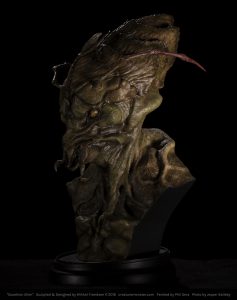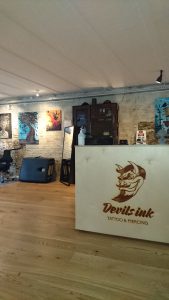As a short story writer, I constantly send out stories to science fiction and fantasy magazines. I’ve collected over 850 rejections, and sold a story for approximately every twenty-five submissions. Needless to say, I’m working on improving my hit rate, and for that I’ll take any advice I can get.
One gem that can be found in the guidelines of many magazines is this: “Read a few issues of the magazine to get a feel for the kind of stories we print.”
Getting that feel is tougher than it sounds, though, because many editors will buy a great story even if it isn’t a typical match for the magazine. Still, magazines do have distinct styles, so in theory pinpointing what makes each magazine unique should make it easier to send a story the editor wants.
And even if it doesn’t result in increased sales, it’s still a great excuse to read a lot of short stories.
Enter stage left: ‘Read a few Issues’, a series in which I aim to reveal what makes each magazine unique.
I’ll start with Beneath Ceaseless Skies, a fantasy magazine that’s been a longtime favorite of mine.
BCS specializes in literary secondary world fantasy. Their ‘About’ page has this to say:
We want stories that combine the best of traditional adventure fantasy and realist literary writing—adventure fantasy plots in vivid secondary worlds, but written with a literary flair. Beneath Ceaseless Skies features exciting stories set in awe-inspiring places that are told with all the skill and impact of modern literary-influenced fantasy.
When you visit their submission guidelines–a must for any writer who wants their stories considered–you’ll find their definition of secondary world setting. The gist is that it’s a world that is different from our own primary world in some way, whether it’s in terms of zoology, climate, physics, or history. But seriously: Read the full guidelines. They say a lot about what BCS looks for in characters, narrative style and originality.
If you want to know more, BCS editor Scott H. Andrews has also given many interviews on the internet. This one, at the Odyssey workshop, has a lot to say about worldbuilding, characters and more.
However, it’s in the stories that the concepts set out in the guidelines truly come to life, so I’m going to look at how the stories deal with ‘Secondary World Settings’, ‘Characters’ and ‘Originality’.
What I’ve read
BCS posts two-story issues every fortnight. Sometimes they include a podcast and sometimes reprint a story from their archives. I decided to read some of the newest issues… and in the meantime work got in the way of actually writing this article, so BCS is now up to issue 220.
- Jonathan Edelstein: Abere and the Poisoner (#208)
- Greg Kurzawa: Masks of the Mud God (#213)
- Daniel Baker: The Marvelous Inventions of Mr. Tock (#213)
- Claire Humphreys: Wooden Boxes Lined with the Tongues of Doves (#216)
- Eleanna Castroianni: Think of Winter (#216)
- Cae Hawksmoor: Requiem for the Unchained (#217)
- Tony Pi: Proteus Lost (#217)
- Melissa Lingen: Out of the Woods (#218)
- Margaret Killjoy: Men of the Ashen Morrow (#218)
Secondary Worlds
Scott H. Andrews, the editor of BCS, is serious about this. Every story I’ve read is different from this world in a crucial way, and the worldbuilding varies a lot.
At one end of the spectrum we have a few stories that take place in otherworldly places.
In Margaret Killjoy’s ‘Men of the Ashen Morrow‘, a sacrifice to a creature-god called Hulokk is necessary to end the summer and usher in the winter that keeps the creatures of the west at bay. Seasons as we know them don’t exist in this world, and the monstrous Hulokk has imposed his own rules and necessities on the inhabitants. Magic can keep the god at bay, sometimes.
Jonathan Edelstein’s ‘Abere and the Poisoner‘ takes place on a world where gods have fallen to the ground, or landed, forming islands in the sea. Each god/island has specific properties that infuse the plants and indeed the inhabitants of each island.
Cae Hawksmoor’s ‘Requiem for the Unchained‘ follows the captain of an airship capable of navigating geiststorms, which consist of millions of lost souls, who attack the living. This concept is very different from Earth, certainly, but the story also contains shipyards, entrepreneurs and work gangs recognizable from our world.
Daniel Baker tells a detective story in ‘The Marvelous Inventions of Mr. Tock‘, which features enough mechanics and metalworking to qualify it as ‘gearpunk’ (or perhaps some other kind of punk). Either way, the world and plot operate on different principles than our known Earth, but with very recognizable social issues.
With other stories it’s not clear whether we’re on Earth or in similar world, and in fact it’s not really that important. It’s the rules and circumstances that shape the characters’ lives that are central to the story.
Greg Kurzawa’s ‘Masks of the Mud God‘ shows us the life of Miriam, who is one of the Raah, a different race that lives beside humans in a world where legends and gods may come alive. The imagery of the world is familiar: We hear of houses, bridges, bathrooms, languages, civilizations. But there are also legends of gods who walk the earth, and the Raah themselves who seem to have the upper hand in controlling it.
‘Think of Winter‘ by Eleanna Castroianni features earthly elements like a knight, a cathedral, and an invading foe, but also a set of Tarots and visions of the future. Very little of the world is explored in this story, since it’s limited to a single location. The real story and worldbuilding is in the main character’s relationship with and reading of his cards.
‘Out of the Woods‘ by Melissa Lingen must have been inspired by Robin Hood. The main character is part of the resistance against the king’s brother while the real king is away. The main character can use magic, though, which turns the story away from the familiar Robin Hood story. Magic also ends up making a very big difference in the end.
Finally, BCS presents stories that clearly take place on Earth, although some rules have changed.
Tony Pi’s ‘Proteus Lost‘ unfolds in Italy at a time when the Spanish Armada is preparing to set sail for England. The ‘secondary’ element comes from the magic of the world, more specifically the magic of shapeshifting, which the characters explore with scientific precision. The magic in this story is a natural force to be understood and controlled.
In ‘Wooden Boxes Lined with the Tongues of Doves‘, Claire Humphreys presents a world that gave me a lot of associations to England during World War One. The magic is at once very specific, in the form of the collection of dove tongues, and vague in that the magician’s tricks aren’t truly revealed. (Though this isn’t a review, I also have to say that I found ‘Wooden Boxes Lined with the Tongues of Doves’ a touching, disturbing story with an unexpected ending.)
Characters
About characters, BCS’s guidelines say:
We strongly prefer characters who yearn for something, external or internal, and feel driven to attain it.
You get exactly that from all the stories. It’s also clear that the yearning and drive is always intertwined with the rules specific to the world.
Tony Pi’s main character faces a problem that he must solve by understanding shapeshifting magic. The nameless poet in Jonathan Edelstein’s comes to an island for a flower with magical abilities that’s critical to his goals. Sal, the main character of Men of the Ashen Morrow, has a very clear goal related to dealing with the sacrifices demanded by Hulokk. Melissa Lingen’s main character resists the false king to fight for the righteous one, but during the story her goals change, and as a result she ends up changing some of the rules in her world. And in ‘Masks of the Mud God’, Miriam the Raah faces a problem specific to her race: that the Raah eat their children.
Originality
In conclusion, the stories in BCS are very much the product of the worlds, and the characters and their goals are in large part defined by those worlds.
This is also what makes the stories original. The characters work and live and have their home in their own worlds. The world is part of them as much as they are part of it. Moreover, in their battles the characters are often pitted against their world. Robin Hood themes, tarots, gods and magic may be well-known tropes in fantasy stories, but the characters and the distinct rules and hardships of each world gives these stories an edge that qualifies as originality.
I plan to run ‘Read a few Issues’ on the blog about three times this year, so check back again in June to hear more about another magazine.
 So, it turns out Florence is nice this time of year.
So, it turns out Florence is nice this time of year.





